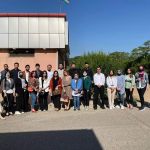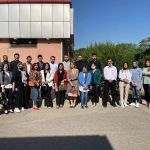A joyful trip to the Forensic Medicine Department In Erbil
As part of the annual activities planned and organized by the Faculty of Law at Tishk International University, stage-five students participated in a scientific trip to Forensic Medicine Institution in Erbil, held on November 10th, 2021. The activity was conducted under the supervision of Dr. Dilman Azad, Mr. Kastro Salim, and Mr. Khalid Xurshid, Lecturers at the Faculty of Law. Forensic medicine is a sector of medical specialties which is associated with the examination and diagnosis of individuals who have been injured by or who have died because of external or unnatural causes such as poisoning, assault, suicide, and other forms of violence.
Forensic medicine is one of the largest and most important areas of forensic science and is also known as legal medicine or medical jurisprudence. It applies medical knowledge to criminal and civil law. Areas of medicine that are commonly involved in forensic medicine are anatomy, pathology, and psychiatry. Medical jurisprudence or forensic medicine is the application of medical science to legal problems. It is typically involved in cases concerning blood relationships, mental illness, injury, or death resulting from violence. An autopsy is often used to determine the cause of death, particularly in cases where criminal activity is suspected or detected. Post-mortem examination can determine not only the immediate agent of death but may also yield important contextual information, such as how long since the individual passed away.
Students met with Dr. Bakhtyar, one of the forensic doctors in the Forensic Medicine Department who joined the students during the trip to present the place, and introduce students to the following departments:
1- Sector of the Dead and Corpses.
2- Human Remains Sector.
3- Human Anatomy Sector.
4- Analytics and Laboratories
It was a useful scientific experience for the students of law, who by the end of the trip were able to relate the different components of the application of medical knowledge to the legal system and understand how this branch of medicine deals with the application of medical knowledge to the purpose of the law.










